Overview
In this article, we explore nine effective strategies for managing mild anxiety, each designed with compassion in mind. These include:
- Mindfulness
- Exercise
- Sleep routines
- Support networks
- Journaling
- Breathing exercises
- Realistic goal setting
- Professional help
- Relaxation techniques
Each strategy is not only grounded in evidence and research but also highlights the importance of a tailored approach to mental health management.
Have you ever felt overwhelmed by your anxiety? You're not alone. Many individuals find that implementing these strategies can significantly reduce anxiety symptoms and enhance overall emotional well-being. As we delve into each method, remember that your journey to healing is unique, and seeking support is a courageous step.
Mindfulness encourages us to stay present, while regular exercise can uplift our mood and energy levels. Establishing consistent sleep routines nurtures our bodies and minds, helping us to cope better with stress. Support networks, whether friends or family, provide a comforting safety net during challenging times. Journaling can be a powerful tool for self-reflection, allowing us to process our thoughts and feelings.
Breathing exercises serve as a gentle reminder to pause and reconnect with ourselves. Setting realistic goals can foster a sense of accomplishment and motivation. Professional help, when needed, offers expert guidance tailored to your specific needs. Finally, relaxation techniques can help us unwind and restore balance in our lives.
As we explore these strategies further, consider how they might resonate with your own experiences. Remember, taking small steps towards managing your anxiety can lead to significant improvements in your emotional health. Embrace this journey with kindness towards yourself, and know that seeking help is a sign of strength.
Introduction
Exploring the landscape of mental health reveals a significant challenge: mild anxiety affects millions, often leaving individuals feeling isolated and overwhelmed. Have you ever felt this way? This article delves into nine effective strategies for managing mild anxiety, offering you practical tools to reclaim your emotional well-being.
But what happens when traditional methods fall short? How can personalized approaches make a difference in navigating this complex emotional terrain? As we explore this further, you'll find insights that resonate with your journey, nurturing a sense of connection and understanding.
The Emerald Couch: Tailored Psychotherapy for Mild Anxiety Management
The Emerald Couch, located in Denver, Colorado, is a dedicated psychotherapy practice that prioritizes trauma and stress-related disorders. Here, we understand that every individual is unique, and we focus on providing customized therapy sessions tailored to the specific needs of those experiencing mild anxiety. Have you ever felt overwhelmed by your past? Our compassionate therapists employ evidence-based practices, ensuring that clients receive effective care that nurtures their emotional well-being. This personalized approach is crucial for effective stress management, recognizing that each person is more than just their past experiences.
In 2022, approximately 21.4% of women and 14.8% of men reported experiencing symptoms of mild anxiety. This statistic underscores the importance of customized interventions in fostering healing and resilience. At The Emerald Couch, our commitment to high-quality, personalized support not only encourages recovery but also empowers clients to manage their distress with confidence.
Recent trends in trauma-focused therapy emphasize the effectiveness of personalized care. Studies reveal that around 60% of adults receiving psychotherapy report significant improvement after completing a course of therapy that includes cognitive-behavioral techniques. This reinforces the value of seeking specialized support, particularly in a nurturing environment like ours. Here, clients can safely explore , embarking on a journey towards healing and self-discovery.
Practice Mindfulness: Techniques to Ground Yourself in the Present
Mindfulness techniques, such as deep breathing and body scans, are wonderful tools for grounding ourselves in the present moment. Have you ever felt overwhelmed by anxious thoughts? By focusing on your breath or the physical sensations in your body, you can cultivate a sense of calm that helps ease those worries. Research shows that mindfulness practices can lead to significant reductions in stress symptoms, with studies indicating an effect size of 0.38 after just eight weeks of mindfulness training.
As we explore this further, consistent mindfulness practice not only enhances emotional control but also builds resilience, making it a vital approach for managing mild anxiety. Case studies reveal that participants who engaged in mindfulness-based stress reduction (MBSR) reported greater self-awareness and effective strategies for handling stress. Moreover, these practices have been linked to neurobiological changes, including reductions in hormonal and immunological markers of acute stress, which support emotional regulation. This highlights their potential in alleviating distress.
Integrating mindfulness into your daily routine can empower you to manage stress more effectively, ultimately enhancing your overall psychological well-being. It's important to recognize that stress-related disorders are common among youth, with a prevalence of 10 to 19 percent according to the World Health Organization. This underscores the importance of embracing mindfulness techniques.
While the are numerous, some research suggests limitations, such as insufficient evidence for improved health-related quality of life. It's essential to consider these factors as you explore these methods. Remember, seeking support and understanding your emotional journey is a courageous step toward healing.
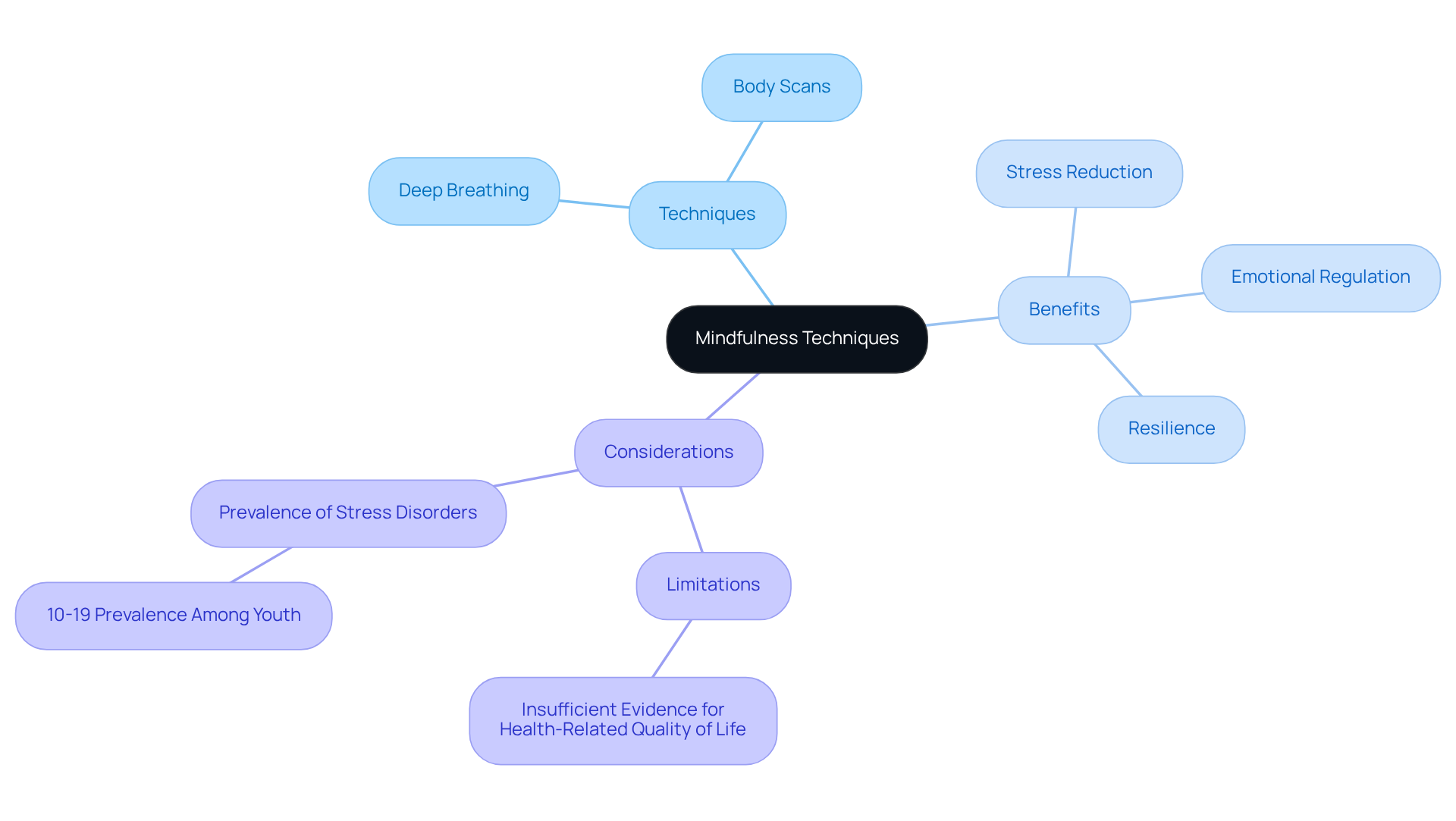
Incorporate Regular Exercise: Boost Your Mood and Reduce Anxiety
Incorporating regular exercise into your routine—whether through walking, jogging, or yoga—can lead to significant reductions in stress levels. Have you ever felt overwhelmed by your daily challenges? Striving for a minimum of 30 minutes of moderate activity on most days can be a gentle yet powerful step forward. Experts suggest three to five 45-minute sessions weekly to unlock optimal cognitive advantages. Research indicates that individuals who maintain have an almost 60% lower risk of developing disorders related to mild anxiety over time. This is largely due to the release of endorphins and neurotransmitters during physical activity, which serve as natural mood enhancers.
A thorough investigation examining information from nearly 400,000 individuals discovered that exercise can yield effects similar to psychotherapy and medication in addressing psychological problems, including mild anxiety. Moreover, specialists advise participating in various forms of physical exercises, like brisk walking, weight lifting, and yoga, to attain maximum psychological benefits. Dr. Singh emphasizes that exercise should be viewed as a valid first-line approach for concerns such as mild anxiety and overall mental wellness. Regular involvement in these activities not only enhances physical condition but also promotes resilience and emotional wellness. This establishes exercise as an essential part of any stress management approach, encouraging you to embrace these practices for a healthier, more balanced life.
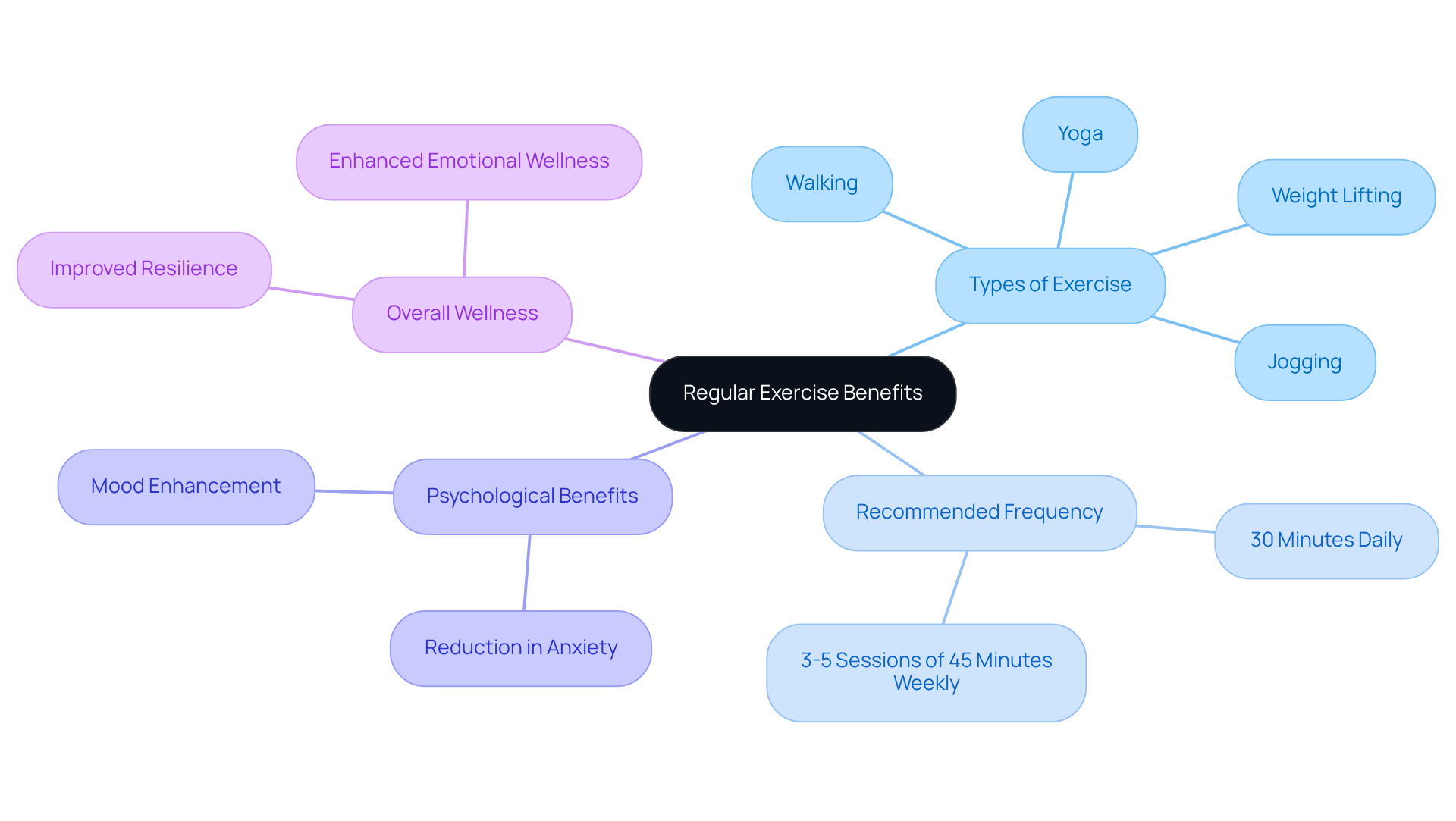
Establish a Sleep Routine: Prioritize Rest for Better Mental Health
Prioritizing sleep is essential for effectively managing stress. Have you ever noticed how a good night's rest can change your perspective? Establishing a regular sleep pattern—going to bed and waking up at the same time each day—can significantly enhance your psychological well-being. Studies suggest that adults should aim for 7-9 hours of restorative sleep each night, yet many find themselves only getting 6-7 hours. This shortfall can lead to . Alarmingly, 1 in 3 Americans fall short of the recommended sleep, highlighting the widespread nature of sleep deprivation and its impact on overall well-being.
Creating a calming bedtime ritual, such as reading or meditating, can signal to your body that it’s time to wind down. This simple act promotes relaxation and improves sleep quality. Quality sleep not only enhances your ability to cope with stress but also plays a crucial role in reducing mild anxiety and emotional regulation. Research indicates that individuals experiencing stress are five times more likely to have shorter sleep durations and less efficient sleep. Moreover, nearly half of those with below-average sleep quality report their mental health as poor, in stark contrast to only 11% of those enjoying above-average sleep quality. This disparity underscores the importance of establishing a sleep routine as a foundational strategy for managing mild anxiety.
As we explore further, incorporating expert recommendations can be beneficial. Limiting screen time before bed is vital, as the blue light emitted from screens can suppress melatonin production. Additionally, practicing relaxation techniques can further enhance your sleep quality. For those facing sleep difficulties, Cognitive Behavioral Therapy for Insomnia (CBT-I) is an effective approach to address insomnia exacerbated by stress. By prioritizing rest, you can create a positive feedback loop that nurtures resilience and emotional health, ultimately reducing stress symptoms. Remember, taking these steps is a compassionate act towards yourself—a way to foster healing and well-being.
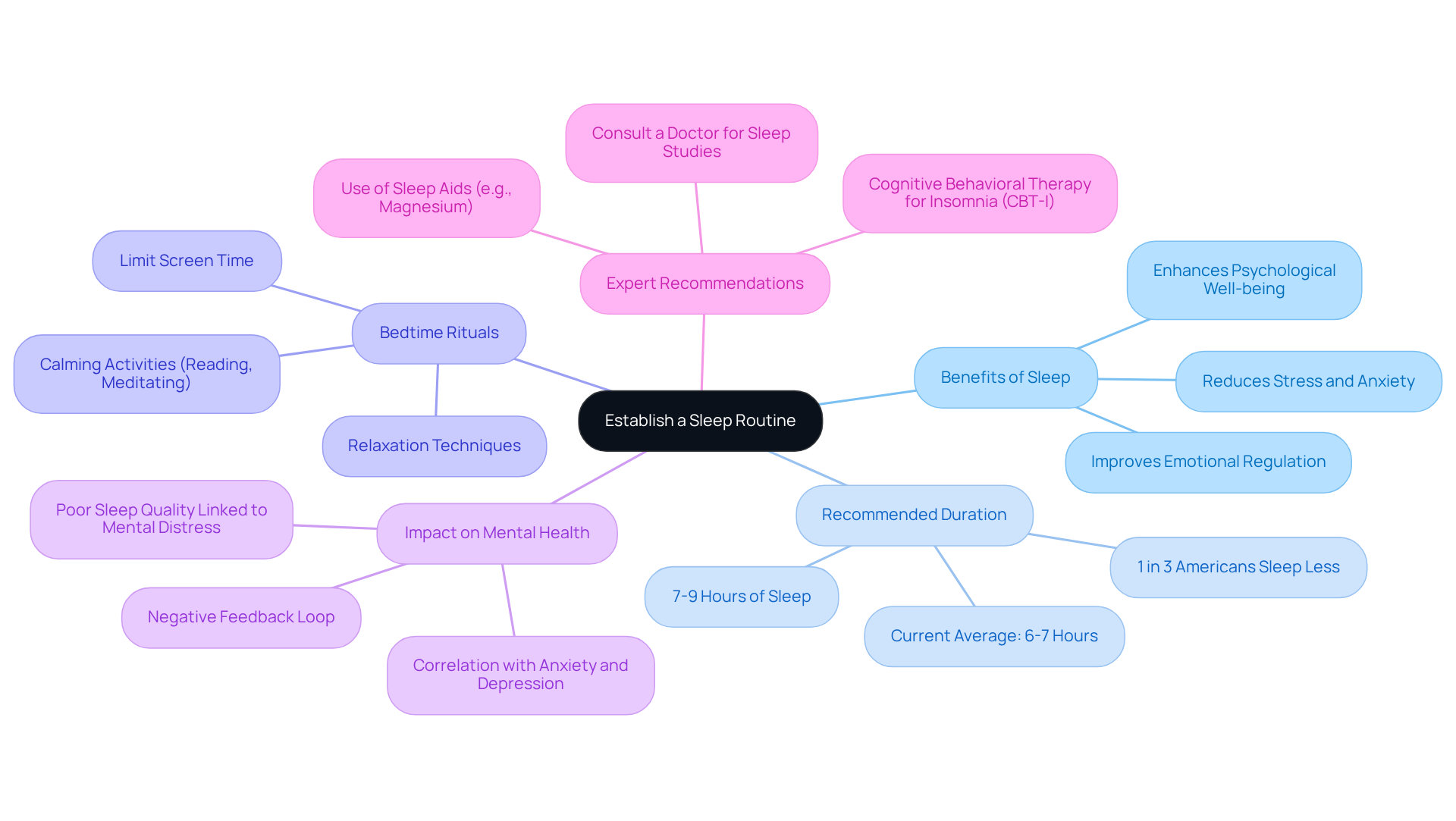
Build a Support Network: Connect with Friends and Family for Emotional Support
Building of friends and family is crucial for easing mild anxiety, particularly for parents navigating the challenges of postpartum experiences. At The Emerald Couch, we recognize that parenting can feel overwhelming. Have you ever felt the weight of these emotions? Reaching out to loved ones to share your feelings can help reduce mild anxiety and create a vital safety net during .
Participating in social activities fosters a sense of belonging, which is essential in addressing the isolation often linked with stress. Research shows that emotional support is significantly related to reduced stress levels and can be beneficial in managing mild anxiety, particularly among those facing postpartum challenges. Notably, studies reveal inverse associations between perceived social support and postpartum depression (PPD) and scores of mild anxiety, underscoring the protective role of social connections.
Individuals with robust social support networks often report greater life satisfaction and reduced stress. Furthermore, psychologists emphasize that nurturing relationships can act as a buffer against stress and mild anxiety, enhancing overall mental health. By focusing on relationships with friends and family, and pursuing supportive therapy at The Emerald Couch, you can cultivate a strong support network that not only helps manage stress but also enhances your emotional well-being.
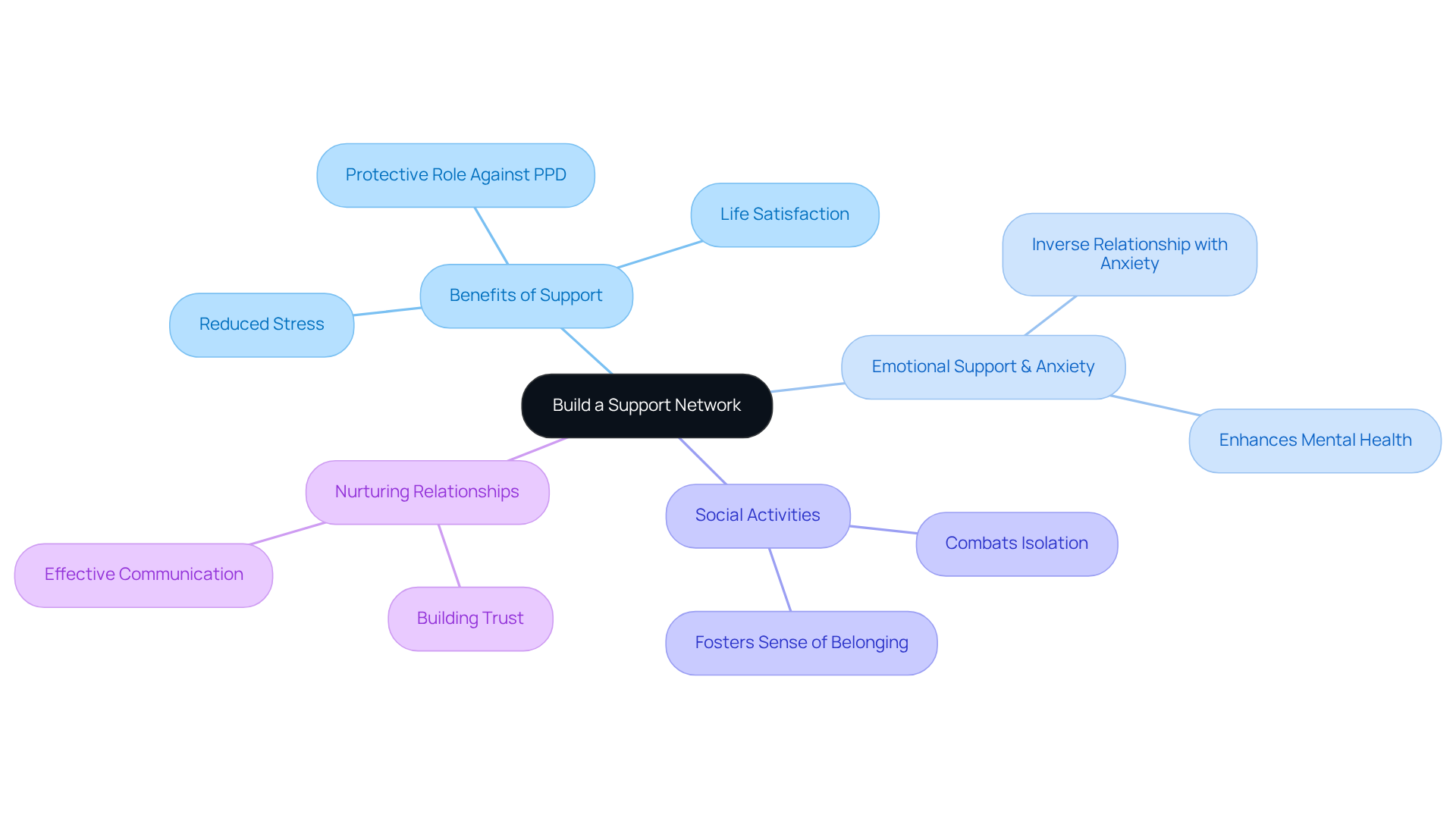
Utilize Journaling: Express Your Thoughts and Feelings to Manage Anxiety
Journaling serves as a powerful tool for managing stress, allowing individuals to articulate their thoughts and emotions in a structured manner. Have you ever felt overwhelmed by your worries? By setting aside time each day to write, you can uncover patterns in your concerns and create a safe space for emotional expression. Research indicates that regular journaling can lead to a 30-40% reduction in stress levels, showcasing its effectiveness as a coping strategy. Additionally, studies have shown that expressive writing significantly decreases stress symptoms, with participants reporting an average reduction of 9% in their stress scores after engaging in journaling interventions.
At The Emerald Couch, we recognize that overachievers often experience mild anxiety, along with feelings of overwhelm or burnout. Journaling can be an invaluable resource in your therapeutic journey. Case studies highlight the positive impact of journaling on psychological well-being. For instance, individuals participating in reported decreased worry and mental distress, including mild anxiety, along with increased resilience over time. This aligns with findings that suggest journaling fosters self-awareness, enabling individuals to gain clarity about their emotions and triggers. As therapists frequently observe, journaling not only aids in emotional regulation but also encourages personal growth and insight.
Integrating journaling into your daily routine can transform your approach to stress management, making it a meaningful complement to traditional therapeutic practices. By reflecting on your experiences through writing, you can cultivate a deeper understanding of your emotional landscape, ultimately leading to enhanced mental well-being. We invite you to begin your journaling journey today and consider scheduling a consultation with us to explore how we can further support you on this path.
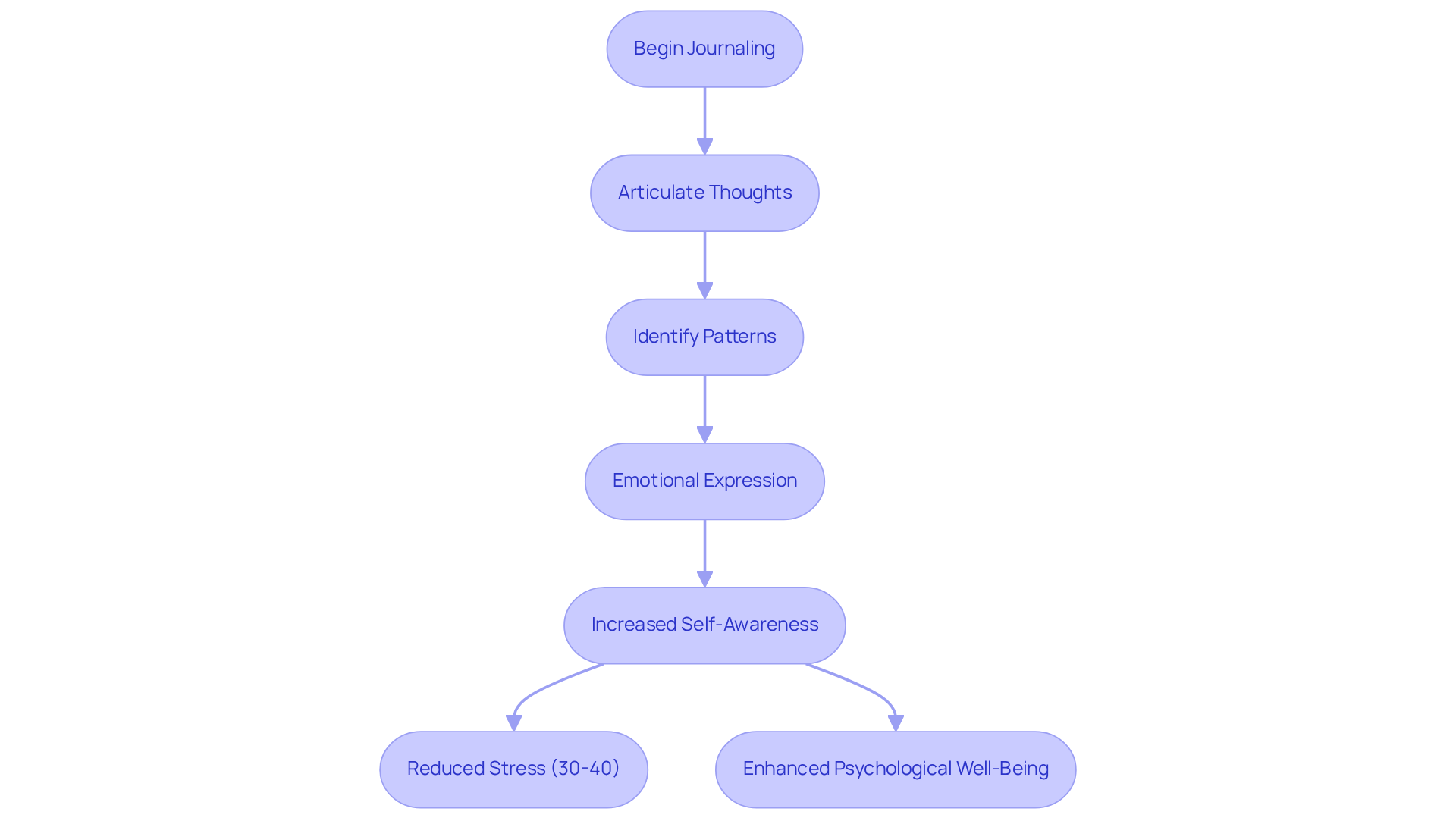
Practice Breathing Exercises: Calm Your Mind and Body Instantly
Breathing exercises, particularly the 4-7-8 technique, serve as effective tools for calming both the mind and body. Have you ever felt overwhelmed by stress? To practice this nurturing method, follow these steps:
- Inhale deeply through your nose for a count of four.
- Hold your breath for seven seconds.
- Exhale slowly through your mouth for a count of eight.
This gentle cycle can be repeated one to two times daily, significantly decreasing stress and encouraging relaxation. However, it's important to remember that some individuals may experience lightheadedness as a side effect of this technique.
Research shows that these breathing methods activate the parasympathetic nervous system, which helps in reducing stress levels and alleviating symptoms of mild anxiety. For instance, studies have demonstrated that consistent practice of diaphragmatic breathing can lead to significant enhancements in stress management. Participants often report decreased feelings of tension and a decrease in mild anxiety, along with improved emotional regulation. In fact, a scoping review identified that various breathwork interventions lead to notable improvements in distress symptoms related to mild anxiety.
The 4-7-8 technique, in particular, has been highlighted for its simplicity and effectiveness, making it a versatile choice for those seeking immediate relief from stress. Mental health experts, like Jenna Zaffino, emphasize that focusing on breath can disrupt the stress cycle, allowing individuals to regain control over their emotional reactions. As Jenna notes, "Stabilizing your breathing and taking prolonged pauses can interrupt your stress cycle, release tension, and slow your heart rate."
By incorporating into your everyday practices, you can create an effective approach to handling stress and promoting a sense of tranquility. Remember, taking small steps toward self-care can lead to profound changes in your emotional well-being.
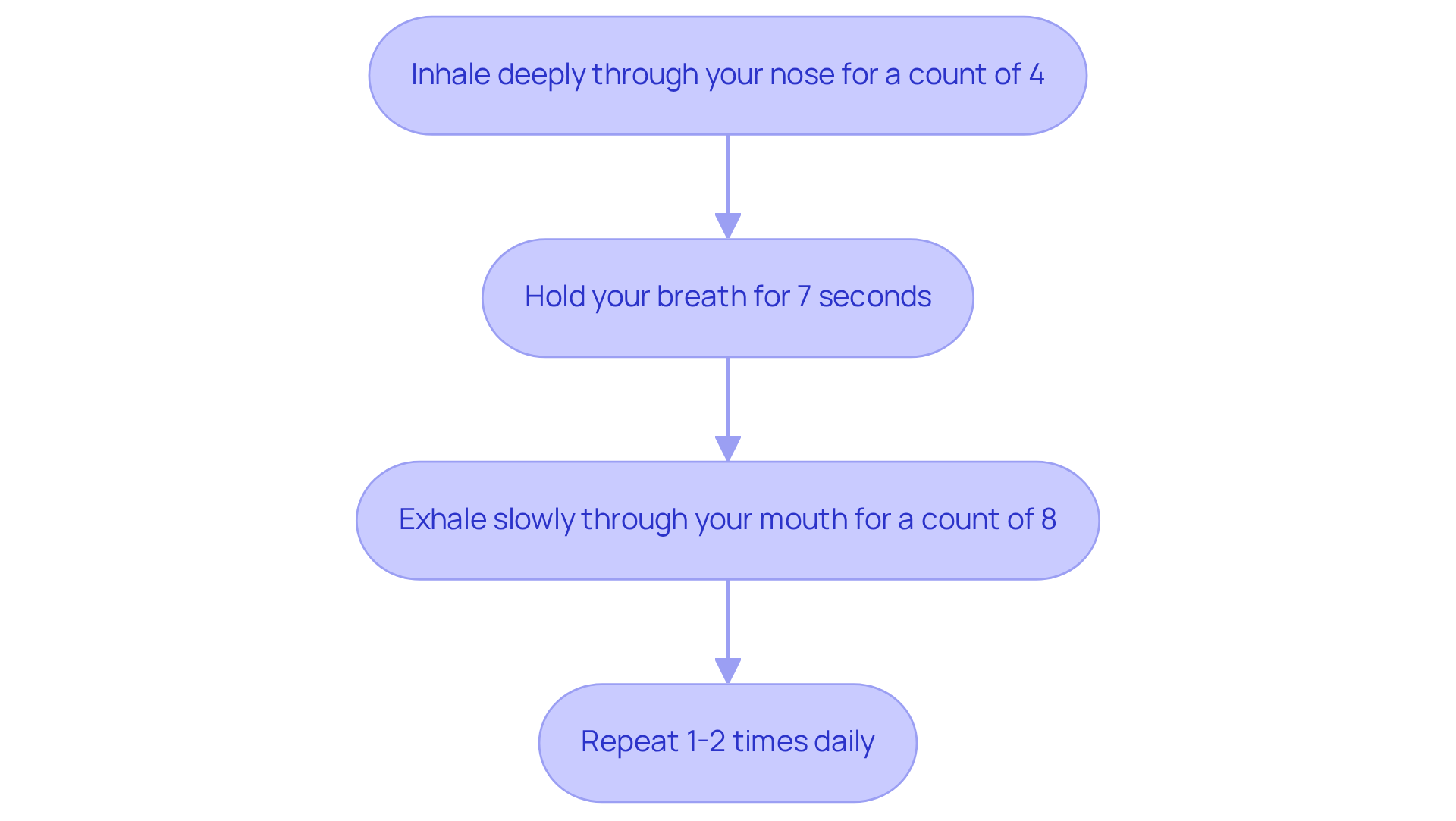
Set Realistic Goals: Create Achievable Steps to Reduce Anxiety
Establishing practical and attainable objectives is essential for effectively handling stress. Have you ever felt overwhelmed by your past? By employing the SMART criteria—Specific, Measurable, Achievable, Relevant, and Time-bound—you can clearly define your objectives and pave the way towards healing. Studies suggest that individuals who establish clear and quantifiable objectives experience greater motivation and involvement in therapy, leading to . For instance, one study found that those with well-defined objectives attended more therapy sessions, which is associated with better stress management.
To avoid feeling overwhelmed, consider breaking larger tasks into smaller, manageable steps. This incremental approach not only makes the process less daunting but also allows you to celebrate small victories along the way. Case studies have shown that individuals who employed structured goal planning reported significant reductions in stress levels, highlighting the effectiveness of this nurturing strategy. By concentrating on attainable actions, you can foster a sense of advancement and authority, which is vital for alleviating stress and enhancing your overall well-being. As we explore this further, remember that you are not alone on this journey.
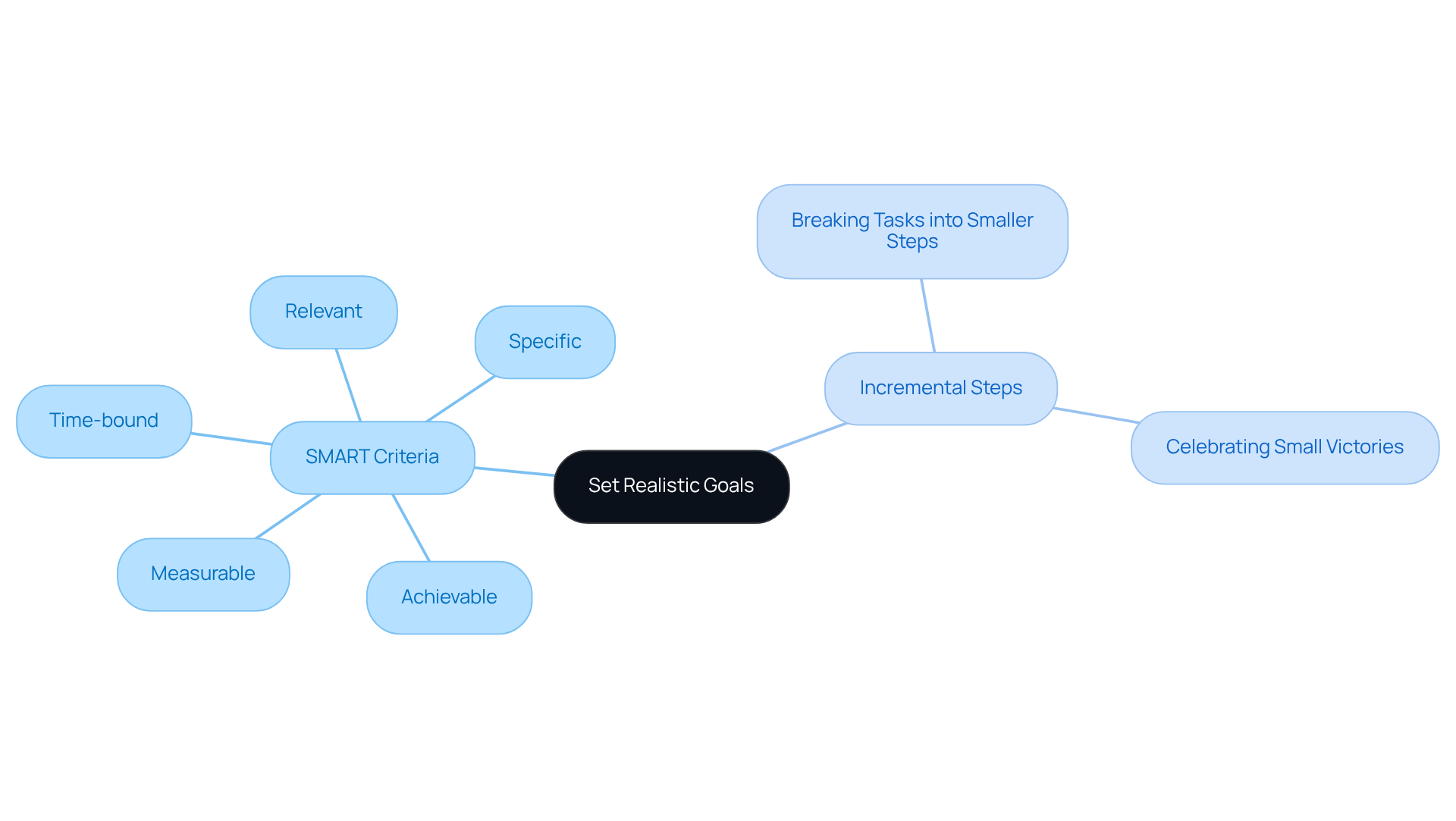
Seek Professional Help: Engage with Therapists for Effective Anxiety Management
When stress results in mild anxiety, seeking professional help is crucial. Have you ever experienced mild anxiety, feeling like the weight of the world is on your shoulders? At The Emerald Couch, our therapists are dedicated to offering customized treatment plans tailored to your specific needs, ensuring that you receive the most effective care possible. Our services include both face-to-face counseling and telehealth options, providing you with the flexibility to choose what works best for you. Participating in therapy equips you with vital tools and techniques for managing mild anxiety, significantly enhancing your ability to navigate challenges and fostering overall emotional health.
Research indicates that cognitive-behavioral therapy (CBT) is one of the most effective interventions, with effect sizes ranging from g=0.88 to g=1.20 for . Moreover, around 49.5% of individuals experience a favorable reaction to therapy after treatment, with follow-up rates reaching 53.6%. This highlights the lasting impact of professional support. At The Emerald Couch, clients benefit from a nurturing atmosphere that encourages the exploration of their mental well-being needs, particularly for those who may feel overwhelmed or burnt out.
Our approach is designed to help you manage trauma and stress, promoting a sense of safety and comfort. As we explore this further, understanding when to seek professional assistance is essential for managing mild anxiety and achieving long-term emotional well-being. Remember, you are not alone on this journey, and reaching out for help is a courageous step toward healing.
Explore Relaxation Techniques: Find What Works Best for You
Exploring various relaxation methods can be a wonderful journey toward managing stress and mild anxiety while enhancing your overall well-being. Among the most effective techniques are:
PMR, in particular, has shown significant benefits, with research indicating a medium to large effect size in alleviating distress. For instance, a meta-analysis revealed that PMR consistently leads to meaningful decreases in stress levels, making it a valuable tool for those seeking relief.
Guided imagery is another powerful approach, demonstrating its ability to reduce stress through visualization exercises that promote relaxation. Research suggests that individuals engaging in guided imagery often experience notable reductions in physiological stress markers, such as electrodermal activity, highlighting its effectiveness in soothing both the mind and body.
Yoga, which beautifully integrates physical postures, breathing techniques, and meditation, also plays a crucial role in managing stress. Studies have indicated that regular yoga practice can lead to , with participants reporting increased emotional resilience and reduced tension.
To discover what resonates best with you, it’s important to experiment with these methods and weave them into your daily routine. Engaging in relaxation techniques not only fosters a sense of tranquility but also empowers individuals to take charge of their mental well-being. As mental health professionals often remind us, the path to managing mild anxiety is unique for each person, and finding the right relaxation method can be a transformative step toward healing.
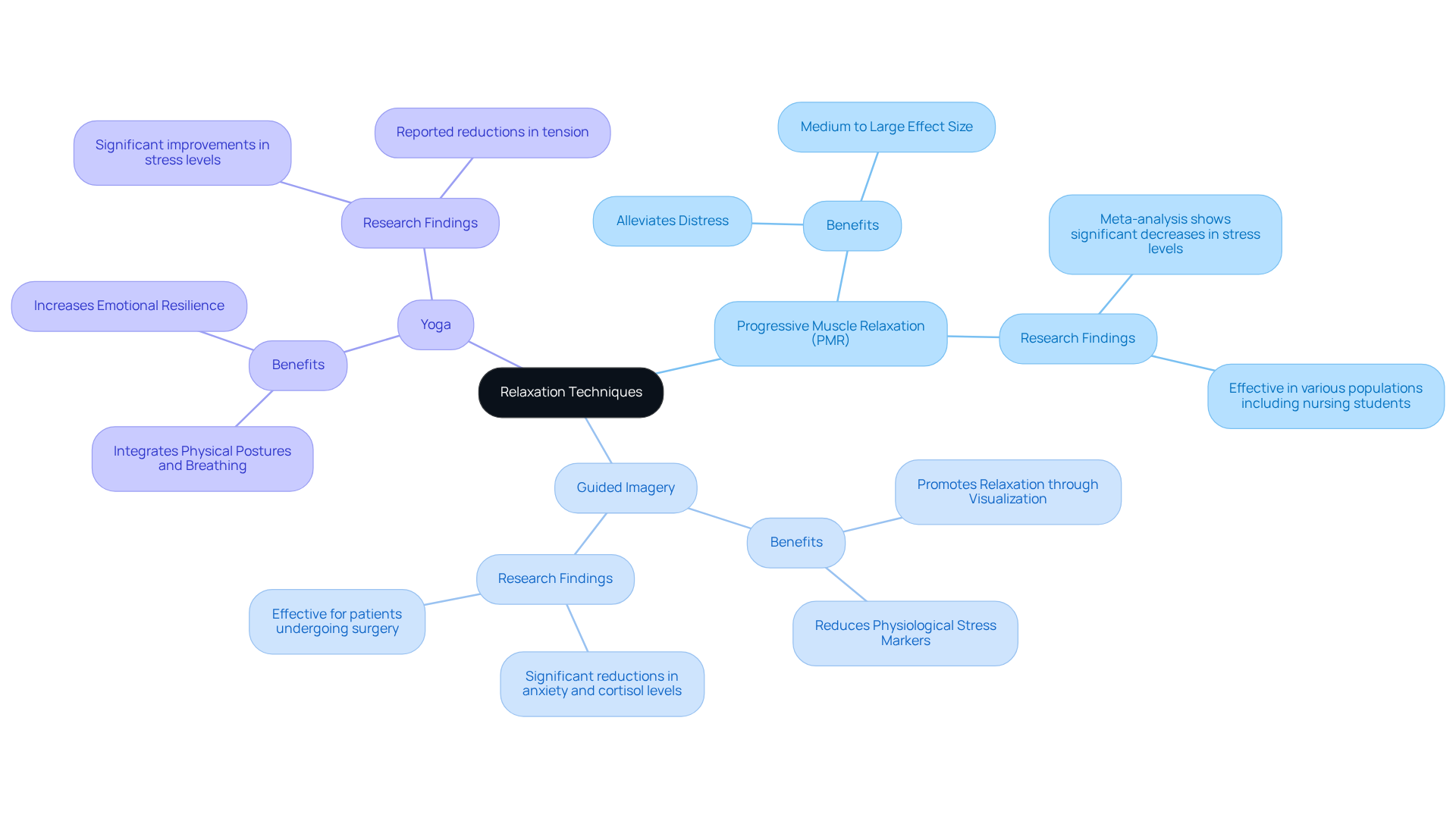
Conclusion
Embracing effective strategies for managing mild anxiety is essential for nurturing emotional well-being and resilience. The tailored approaches discussed—such as mindfulness, exercise, establishing a sleep routine, and seeking professional help—illustrate that individuals can take proactive steps toward alleviating their anxiety. Each method offers unique benefits contributing to a holistic approach to mental health, emphasizing the importance of personalized care in the journey toward healing.
As we explore this further, key insights emerge on how:
- Mindfulness practices
- Regular physical activity
- Sleep hygiene
- Social support
- Journaling
- Breathing exercises
- Realistic goal-setting
- Professional therapy
can all play a significant role in managing mild anxiety. The evidence supporting these strategies highlights their effectiveness and underscores the value of a comprehensive approach to mental health care. By integrating these techniques into daily life, individuals can cultivate a greater sense of control over their emotional landscape.
Ultimately, the journey to managing mild anxiety is deeply personal and unique for each individual. Have you ever felt overwhelmed by your past? It is crucial to explore various techniques to find the ones that resonate most and to remember that seeking support is a sign of strength. By taking these steps, individuals not only enhance their ability to cope with anxiety but also promote overall well-being, paving the way for a healthier and more balanced life.
Frequently Asked Questions
What is The Emerald Couch and what services do they offer?
The Emerald Couch is a psychotherapy practice located in Denver, Colorado, specializing in trauma and stress-related disorders. They provide customized therapy sessions tailored to individuals experiencing mild anxiety, focusing on effective care and emotional well-being.
What is the significance of personalized therapy at The Emerald Couch?
Personalized therapy is crucial for effective stress management as it recognizes that each individual is unique. The Emerald Couch emphasizes customized interventions to foster healing and resilience, empowering clients to manage their distress confidently.
What statistics highlight the prevalence of mild anxiety?
In 2022, approximately 21.4% of women and 14.8% of men reported experiencing symptoms of mild anxiety, underscoring the importance of customized therapeutic interventions.
What are some effective techniques for managing mild anxiety?
Techniques such as mindfulness practices, including deep breathing and body scans, are effective for managing mild anxiety. These techniques help ground individuals in the present moment and can lead to significant reductions in stress symptoms.
How does mindfulness training impact stress levels?
Research indicates that mindfulness practices can lead to significant reductions in stress symptoms, with studies showing an effect size of 0.38 after just eight weeks of mindfulness training.
What role does regular exercise play in reducing anxiety?
Incorporating regular exercise, such as walking, jogging, or yoga, can lead to significant reductions in stress levels and a lower risk of developing mild anxiety disorders. Exercise releases endorphins and neurotransmitters that enhance mood.
How much exercise is recommended for managing anxiety?
Experts recommend striving for a minimum of 30 minutes of moderate physical activity on most days, with three to five 45-minute sessions weekly to achieve optimal cognitive benefits.
Can exercise be as effective as psychotherapy for anxiety management?
Yes, research has shown that exercise can yield effects similar to psychotherapy and medication in addressing psychological problems, including mild anxiety.
What are the potential neurobiological benefits of mindfulness practices?
Mindfulness practices have been linked to neurobiological changes, including reductions in hormonal and immunological markers of acute stress, which support emotional regulation and alleviate distress.
Are there limitations to mindfulness practices?
Some research suggests limitations, such as insufficient evidence for improved health-related quality of life, highlighting the need to consider various factors when exploring mindfulness techniques.




